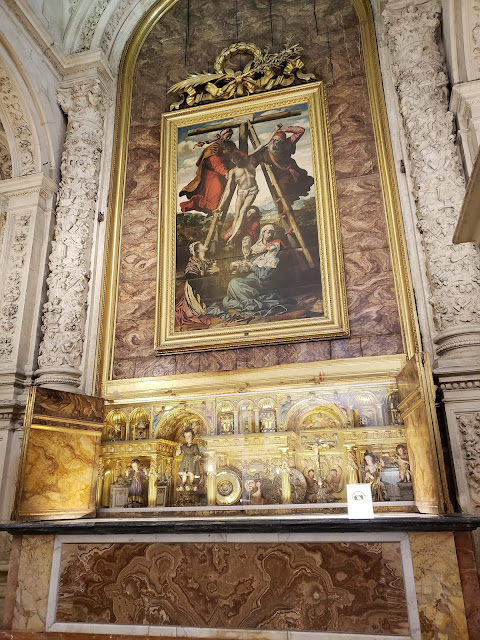Born with the name of Catherine in 1566, St. Mary Magdalene de Pazzi received a religious upbringing. She was initially sent to the Monastery of St. John as a boarder at age 14, but was taken back home by her family who opposed her religious vocation and wanted her to marry well. They eventually gave in, and Catherine became a Carmelite of the Ancient Observance at 16, taking the name Sister Mary Magdalen.
St. Mary Magdalene de Pazzi was endowed with the gift of prophecy and lived as a mystic. In 1598 she became the mistress of novices, and she was chosen as subprioress in 1604. She would hold this position until her death of natural causes on May 25, 1607. The final three years of her life were filled with intense bodily and mental suffering but the saint prayed to suffer more. She led a hidden life of prayer and self-denial, praying particularly for the renewal of the Church and encouraging the sisters in holiness.
She foretold the elevation of Pope Leo XI in a prophecy shortly before her death.
Traditional Reading at Matins:
Mary Magdalen was born at Florence of the illustrious family of the Pazzi. It might be said of her that she entered the way of perfection when a babe. When ten years of age she took a vow of perpetual virginity; and having taken the habit in the Carmelite Monas tery of Our Lady of the Angels, she became a model of every virtue. Such was her purity, that she was entirely ignorant of everything that is opposed to that virtue. She was commanded by God to fast on bread and water for five years, Sundays alone excepted, on which she might partake of Lenten diet. She mortified her body by a hair-shirt, discipline, cold, abstinence, watching, want, and every kind of suffering.
Such was the ardour of divine love that burned within her, that not being able to bear the heat, she was obliged to temper it by applying cold water to her breast. She was frequently in a state of rapture, and the wonderful ecstasies she had were almost daily. In these states, she was permitted to penetrate into heavenly mysteries, and was favoured by God with extraordinary graces. Thus strengthened, she had to endure a long combat with the princes of darkness, as also aridity and desolation of spirit, abandonment by all creatures, and divers temptations: God so willed it, that she might become a model of invincible patience and profound humility.
She was remarkable for her charity towards others. She would frequently sit up the whole night, either doing the work of the sisters, or waiting upon the sick, whose sores she sometimes healed by sucking the wounds. She wept bitterly over the perdition of infidels and sinners, and offered to suffer every sort of torment so that they might be saved. Several years before her death she heroically besought our Lord to take from her the heavenly delights wherewith he favoured her; and was frequently heard saying these words: ‘To suffer; not to die.' At length, worn out by a long and most painful illness, she passed hence to her Spouse, on the twenty-fifth of May, in the year 1607, having completed the forty-first year of her age. Many miracles having been wrought by her merits, both before and after death, she was canonized by Pope Clement the Ninth. Her body is, even to this day, preserved from corruption.
Collect:
O God, lover of chastity, who didst inflame the blessed Virgin, Mary Magdalen, with love for Thee and didst adorn her with heavenly gifts, grant that as we honor her on this festal day, so may we follow her in purity and love. Through our Lord . . .
Prayer Source: 1962 Roman Catholic Daily Missal


















